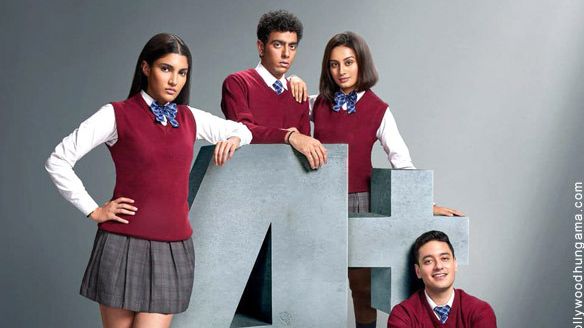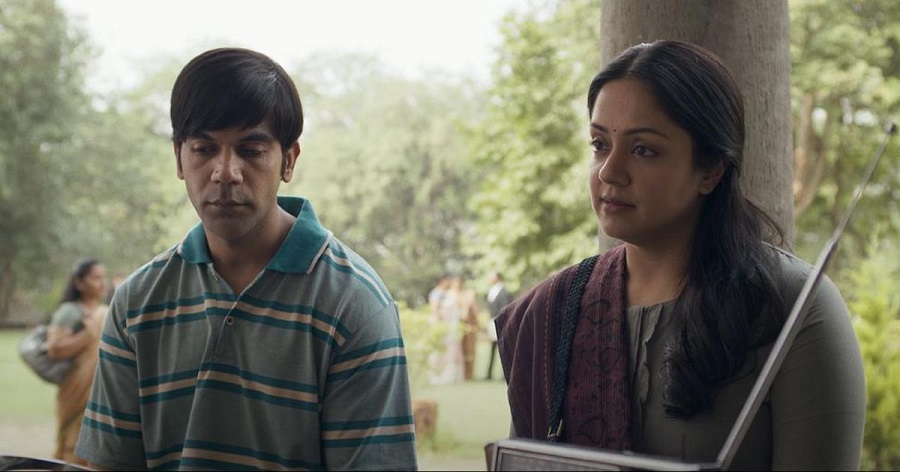Though a literal copy of the Thai film, the Indian social structure, class/ caste divide adds few layers to the original story.
Rating: ⭐️⭐️⭐️ (3 / 5)

By Mayur Lookhar
Farrey or Fa₹₹ey. A complex title that had everyone scratching their heads for its meaning. If Google didn’t have an answer. Then in all probability this is a word straight out of the Shashi Tharoor vocabulary. Is it any synonym to that Tharoorian word farrago? That was ruled out at the trailer launch when one of the cast members stated that people in Delhi would be familiar with the word. We didn’t have our answer until your reviewer saw the film. It turned out to be a code word for keeping, passing chit in exams.
Farrey or Fa₹₹ey [2023] is certainly not from the Tharoor school of grammar. The Soumendra Padhi film is an education on the haves and the have nots. Is the adage being used to justify its immoral plot? No, not really. Farrey does spell out the moral and immoral. A literal copy of Thai film Bad Genius [2017], the Indian social structure, class/ caste divide adds few layers to Nattawut Poonpiriya’s original story.
Director Soumendra Padhi and his writer Abhishek Yadav rightly set their Hindi remake in the national capital. New Delhi, a city known for its robust education system, both in public and the expansive private sector. The latter naturally speaks about its privileges. Farrey is no simple allegory on the haves and the have nots. It’s the impetuosity of its youth that grabs our attention. The four protagonists are a mix of two haves and two have nots. Each one though is different from the other.
Lead character Niyati [Alizeh] is raised in an orphanage, that’s run by an orphan couple [played by Ronit Roy and Juhi Babbar]. Adversities tends to bring out the best in one, especially the strong-willed underprivileged. Niyati is the good genius to begin with. Academically brilliant, she tops the board exam which earns her an admission in the region’s best private high school – Winston International. It’s as opulent like a university in a Karan Johar film, where instead of school buses, there are luxury SUVs. Padhi’s students though look like students.
Niyati befriends Chhavi [Prasanna Bisht], a privileged teen but academically poor. Soon Niyati is cajoled into helping Chhavi and other privileged students clear the examination. The copying moves from elementary to more sophisticated. Welcome the bad genius Niyati. Even through these moments, her conscience oscillates between the good and the bad.
Farrey spells out clearly in its opening disclaimer that this film doesn’t encourage copying. Whilst viewers are exposed to some disruptive copying ideas, the film also cautions you of the dire consequences. Copying is part of the plot, but Farrey grips you due to its leading characters.
Niyati, an apt name for the character and her tumultuous journey. She’s inherited the right values, but as always, the true test of morality arrives when one arrives at the bridge. Niyati initially rejects the overtures of a desperate Chhavi. She heads home to overhear the economic woes of her warden. The only way to save the orphanage is via dirt money. Give one an inch, and they’ll take a mile as Niyati gets entangled into a web.
No justification per se, but the orphan backstory makes you understand the circumstances that led Niyati to the immoral path. Her foster father, warden Shailesh [Ronit Roy] proudly states, “But we never cheated.” Shailesh, though, has seen life. Niyati is only 16-17. We’re not questioning her maturity. It’s the economic reality that stares her in the face.

More than material, Niyati is lulled into cheating by the predicament, words of Chhavi. From toys, dresses, expensive gadgets, Chhavi is every bit her daddy’s princess. Daddy [played by Arbaaz Khan] though has certain expectations too. He wants his princess to emulate her prince brother into getting admission at the prestigious Standford college. Comparison have ruined many sibling relationships. But is Chhavi really caught between a stone and a hard rock? Or is she lying about being weighed down by parents expectations? The nervy, crying Chhavi would move a stone too. But then comes a moment where she spits out, “you took the money, so just do the job you IDIOT” The ferocity of her tone sees her spit at the end of the idiot. (This was no part of the script. Bisht was merely spitting out the actor in her). It’s a moment of realization not just for Niyati, but it also exposes Chhavi’s true character. Young Bisht is flawless throughout her act. After watching Bisht, maybe can we change Mogambo khush huwa to Mogambo prasann huwa.
Chhavi has layers to her, but Prateek [Zeyn Shaw] has this brattish attitude. Shaw showed his class in a similar role in Netflix series Class [2023]. One is suspicious of Prateek from the beginning and he lives up to that billing. Shaw chips in with a decent show.
Done with the rich, it’s the two poor kids who form the backbone of the Farrey story. In the real, she enjoys a certain privilege. Alizeh, Atul Agnihotri’s daughter, more importantly, Salman Khan’s niece, shuts the nepotism debate with a compelling act in her maiden film. In fact, here is a Salman Khan Films production that won’t be accused of being any berozgaar yojana [unemployment scheme]. Padhi and Mukesh Chhabra are bang on in their casting of Alizeh, Bisht, Shaw and Mehta.
During the trailer launch, Alizeh caught our attention when she stated that art should make people think. Least expected from a privileged lot, especially hailing from a family that has built its legacy on mainstream cinema. The very fact that SKF chose this script for a desi adaptation is perhaps a paradigm shift in the production house’s thinking. To expect SKF to back a director like Soumendra Padhi is also refreshing. Alizeh clarified that it was her director who did all the convincing. Though in her early 20s, Alizeh shows maturity way above her age.
Her rooted, deglam look made her an apt choice to play a Niyati. More than tone, she communicates through her eyes. Credit to acclaimed cinematographer Keiko Nakahara for finely capturing Niyati’s dilemma moments. The physicality is complemented by an emotionally gripping act by the young lady. Irrespective of the box office, the debutante Alizeh has shown great promise.
Unheralded actor Sahil Mehta impressed us in Good Luck Jerry [2022]. He is also part of the acclaimed series Tabbar [2021], which this reviewer is yet to see. Mehta was also Akshay Kumar’s young friend in the dud Raksha Bandhan [2022]. We, however, liked him as the dopey Sikh henchman in the underrated dark comedy Good Luck Jerry. The Punjabi naturally transforms himself into this poor laundry woman’s son from Delhi. Akash [Mehta] is not just academically brilliant, but he is firm on his morals. Well, at least initially. He brings the subtle caste factor to the fore. Raised by a single mother, Akash wants a better life for his mother and young sibling. The mother is, too, innocent to understand his son’s academic talent or his dreams. She doesn’t have the means to finance his higher education. In a poignant scene, the mother scolds the son for talking back to an unruly, impatient customer. “You may become successful in your career, but our status will remain the same”, mother tells Akash. Phew, that one word aukaat [status] underlines the perennial caste challenges.
From being this studious, righteous boy, it pains to see Akash transform into this raging teen. For all the mess, wrong doing, one can’t help but be empathetic towards Akash. Mehta is convincing in the two shades.
The physique, clean shaven look. There is certain affluence about Ronit Bose Roy that perhaps makes him unfit to play an orphan or a poor man. Blame it on his negative roles or opulence from Ekta Kapoor’s soaps. Juhi Babbar has too little screentime to make any impression.
After a gripping first half, Farrey appears to be heading to a crescendo. Like a gas balloon, it fizzles out towards the end. The climax isn’t bad, but it’s not thrilling as anticipated. The director though earns respect for not tinkering with the original. It [climax] is what it is. Take it or leave it. Copying is part of the plot, but perhaps the director could have done away with the mass copying. Besides, Winston’s exam invigilators are anything but vigilant.
Padhi’s film treads on an immoral path but it’s a fine allegory on the class/caste divide. More than story, Farrey stands out for its fine cast, and writing. The Farrey story is a reminder of the perils of living in a populous country. It’s a rat race in the name of competition. Rich or poor is immaterial. Even if you win, you’ll still be a rat. Do take pride in your IITS, IIMs, JEEs, CATs, but it’s a rat race in all walks of life. Ironically, Farrey [2023], too, can’t escape the box office rat race. There are means to inflate those numbers, but there is absolutely no foul play in Farrey earning our respect. Copy that!












